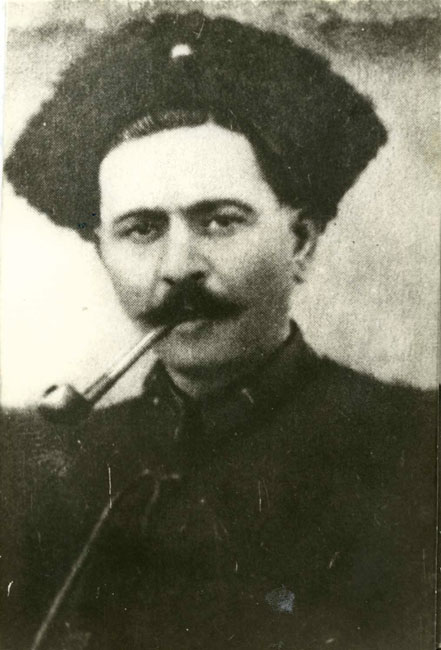Iakov Chapichev was born to a Krymchak Jewish family in 1909 in Paris, after his family had emigrated to France. His father was a shoemaker. In 1923 the family returned to Crimea, the Krymchak area and settled in Dzhankoi. Iakov worked as a barber's assistant and then as a stoker at a railway depot. He learned Russian on his own. Chapichev began his army service in 1931 as an artilleryman in the Crimean Infantry Division.
1934 saw the publication of poems by the young artilleryman in the journalKrasnoarmeets (Red Army man). His first collection of poetry appeared in 1939.
In the same year Chapichev was assigned to the Special Far-eastern Army. While a political commissar with an artillery battery, he took part in a clash with Japanese forces at the Khalkhin Gol River. Then he finished a special one-year course at Military-Political Academy in Moscow in 1940.
When war broke out between Nazi Germany and the Soviet Union on June 22, 1941, the tank division that Chapichev was serving in was rapidly redeployed in the Leningrad area. The situation there was extremely serious. The city had been completely surrounded and its only contact with the "large land" (i.e. Soviet territories not occupied by the Germans) was either by air or via Lake Ladoga. In mid-October 1941 the Germans launched a major offensive aimed at totally blockading the city. During the fierce fighting to repulse an enemy tank attack Chapichev was wounded, but insisted on returning to his division as soon as possible. However, it was as a member of the staff of the army newspaper V boi za Rodinu (In Battle for Motherland) that included "Literaturnye stranitsy" (Literary pages), which published poems and stories by soldiers and officers, including Chapichev himself. Especially popular among the Soviet troops were his unpretentious topical ditties like the following:
"A brave young 'Fritz' set out to fight,
Decking himself out with pride.
'See you soon, dear Greta' he said
As he kissed his love goodbye.
When this 'Fritz' arrived in Tikhvin,
He found the place quite charming -
That is, until he met the 'charms' of 'Katiusha'
[a pun on the nickname of a Russian woman
and the name of a Soviet weapon],
Who sent him right out of this world!"
As a military correspondent, Chapichev spent most of his time on the front lines. On one occasion he took part in an intelligence operation to capture an enemy "tongue," who was then forced to talk. Another time, together with some machine-gunners, he beat back an attack of German infantrymen. He was wounded during one such action and sent to a hospital in the rear.
When he recovered, in 1942 Captain Chapichev was appointed assistant commander in charge of political matters of a unit that was fighting in the Kuban. For his participation in the fighting to liberate the Northern Caucasus and the Kuban, in June 1943 Chapichev was awarded the Order of the Red Star and, later, the Order of the Patriotic War, 2nd class.
In the summer of 1944, with the rank of major and after being wounded once more, Chapichev returned to his division, which was then already in Poland. On January 20, 1945 Soviet forces gained a bridgehead on the Oder River and were approaching the German city of Breslau (now Wrocław, Poland) from the north and south. On March 9, 1945 the Soviet troops were halted at a building that had been heavily fortified by the enemy. In spite of his high position Chapichev, who had joined this group of soldiers, personally led the attack. He was killed in the fighting. On July 27, 1945 Iakov Chapichev was posthumously designated a Hero of the Soviet Union.
It is interesting to note that when he was first cited for honors (in May 1943), Chapichev was identified as a Tatar while subsequently (twice in 1945), he was identified as a Krymchak.







